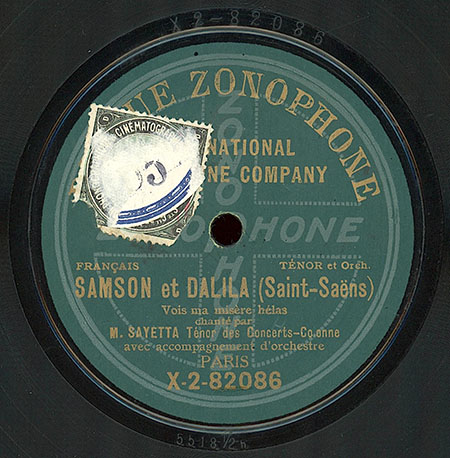Born in Lyon, Henri Sayetta studied voice in Paris, with Numa Auguez. What I believe was his first post was as a chorister at
the Maîtrise de la Madeleine, the (outstanding) church music of the Madeleine church in Paris; he is documented there in 1902 and
1903, while already giving his first solo concerts at the same time.
Then he became a concert soloist, and a voice teacher. He was closely associated with the Concerts Colonne in Paris, plus he sang in
lots of places all over France, and in neighbouring countries, as well: Saint-Quentin, Troyes, Nancy, Lyon, Mulhouse, Geneva, Cologne,
Mannheim... He frequently interpreted Bach, he sang Beethoven's Ninth Symphony, Franck's Béatitudes, Berlioz' "dramatic
symphony" Roméo et Juliette, Liszt's Faust Symphony, even Wagner's Walküre, but strictly in concert
only, never on stage. In 1913 and 1914, he was a member of a mixed quartet, the Quattuor Battaille. After that, it would seem that he
reduced his activity as a singer, but he still appeared in concert in 1927.
In June 1910, he was appointed Officier d'académie.
References:
- Musica et Memoria
- L'Écho de Paris, 23 June 1910
- La Fronde, 30 July 1903
- Le Guetteur de Saint-Quentin et de l'Aisne, 27 January 1911
- L'Intransigeant, 30 April 1914
- Journal des débats politiques et littéraires, 3 May 1914
- Journal officiel de la République française, 1 July 1910
- Journal de Saint-Quentin et de l'Aisne, 25 January 1911
- Le Monde Artiste, 8 March 1913
- The New York Herald (Paris edition), 26 February 1914
- Les Nouvelles de Versailles, 25 May & 1 June 1927
- Le Petit Troyen, 22 December 1911
- Le Progrès de la Somme, 15 June 1913
- Le Rappel, 2 April 1903
Anton Bieber has contributed the recording and label scan: thank you!
